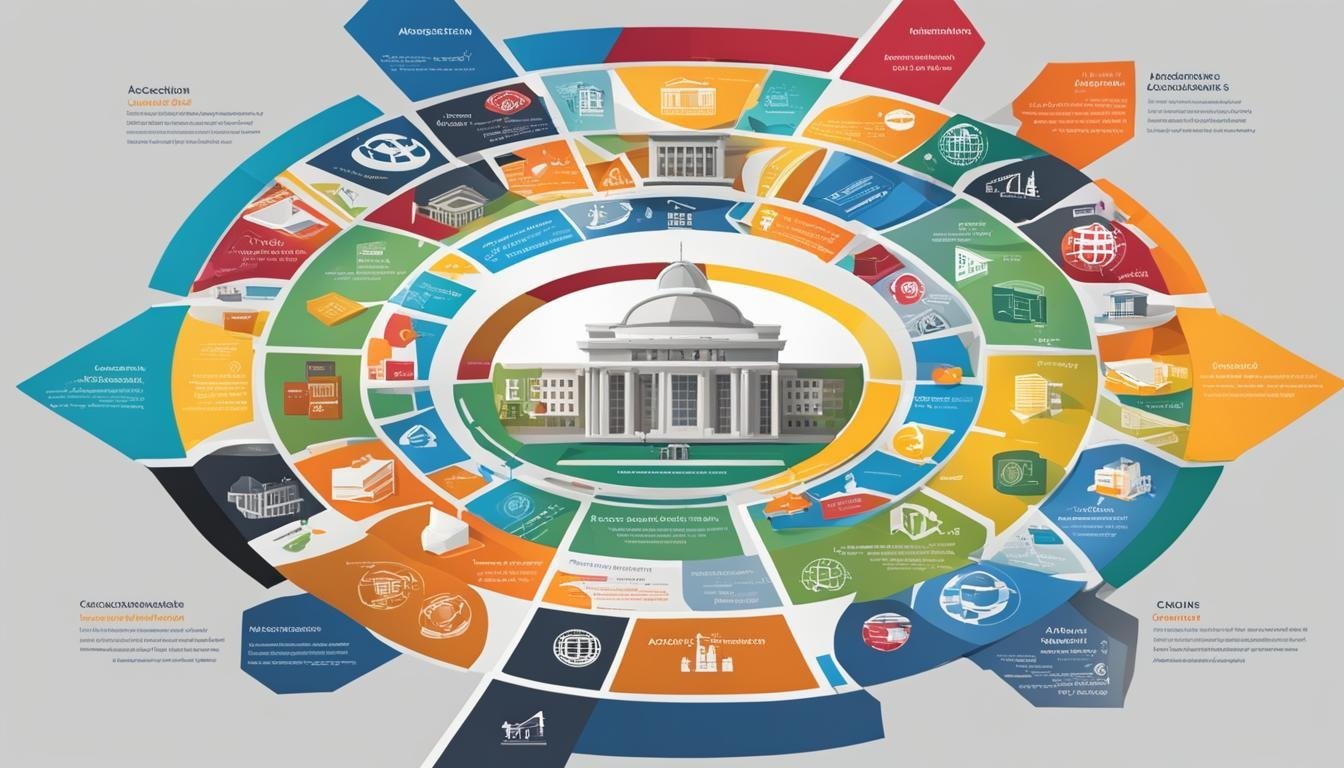Accreditation is a vital process that ensures the quality and credibility of higher education institutions and programs in the United States. It is a rigorous review conducted by recognized accrediting organizations, which are evaluated by the Council for Higher Education Accreditation (CHEA) or the United States Department of Education (USDE). Accreditation is crucial for students seeking federal grants and loans, as well as for employers evaluating the qualifications of potential employees.
By understanding the accreditation standards for US universities, students can make informed decisions about their education and future career paths. This article will explore the importance of college accreditation and shed light on the educational standards upheld by accredited institutions.
Key Takeaways:
- Accreditation ensures the quality of higher education institutions and programs in the US.
- It is conducted by recognized accrediting organizations and evaluated by CHEA or USDE.
- Accreditation is important for students seeking financial aid and employers evaluating credentials.
- Accredited institutions are listed in the CHEA Database of Institutions and Programs.
- Understanding accreditation standards helps students make informed decisions about their education.
What is Accreditation?

Accreditation is the process by which independent accrediting agencies review and confirm that educational institutions meet certain standards of academic excellence. Legitimate accrediting agencies are recognized by the Council for Higher Education Accreditation (CHEA) and/or the United States Department of Education (USDE). Accreditation ensures that students receive a high-quality education, and it is important for accessing financial aid, transferring credits, and finding employment. It is a way to judge the quality of an educational institution and verify its educational merits.
Accreditation plays a crucial role in maintaining and improving the quality of education. Through the accreditation process, educational institutions are assessed against established standards to ensure that they meet the necessary criteria for providing a quality education. Accreditation provides students with the assurance that they are receiving an education that meets certain standards of excellence.
One of the main reasons why accreditation is important is because it allows students to access financial aid. Many federal grant and loan programs require students to attend accredited institutions in order to be eligible for funding. Accreditation also plays a key role in the transferability of credits between institutions. Students who attend accredited institutions can be confident that their credits will be recognized and accepted by other accredited schools.
In addition to financial aid and credit transferability, accreditation is important for career purposes. Many employers value degrees from accredited institutions, as they provide assurance that the education received meets certain quality standards. Accreditation can enhance job prospects and open doors to a wider range of career opportunities.
Types of Accreditation for Colleges

When it comes to accreditation for colleges, there are two main types that institutions can obtain: institutional accreditation and programmatic accreditation.
Institutional accreditation applies to the entire college or university and is granted by either a regional or national accrediting body. Regional accrediting bodies are known for their rigorous standards and typically accredit traditional four-year colleges and universities. On the other hand, national accrediting bodies often accredit vocational schools, trade schools, and specialized colleges.
Programmatic accreditation focuses on specific programs or departments within an institution. This type of accreditation ensures that graduates receive the necessary education and training to succeed in their chosen field. Programmatic accreditation is important for disciplines such as nursing, engineering, business, and education, as it validates the quality of the program and prepares students for their future careers.
Both institutional and programmatic accreditation play a vital role for students. Institutional accreditation ensures that the entire college or university meets certain academic standards, while programmatic accreditation demonstrates that specific programs are of high quality. These types of accreditation are important for students who wish to transfer credits between institutions, as credits earned at accredited institutions are typically more widely recognized. Additionally, employers often value degrees from accredited institutions, as they know that graduates have received a quality education that meets certain standards.
Regional Accreditation vs. National Accreditation
Regional accreditation is generally considered more prestigious and is often required for credits to be easily transferable between institutions. Regional accrediting bodies evaluate colleges and universities within a specific geographic area and focus on ensuring comprehensive academic quality. National accreditation, on the other hand, is typically granted to specialized or vocational institutions and focuses on specific programs or career-oriented education.
Regional accrediting bodies are known for their rigorous standards and typically accredit traditional four-year colleges and universities.
While both types of accreditation are valid and legitimate, it is important for students to carefully consider the type of accreditation their chosen institution holds. Students should research which accrediting body has granted accreditation to their prospective college or program to ensure that it aligns with their academic and career goals.
Benefits of Attending Accredited Colleges
Attending an accredited college offers numerous benefits that contribute to a student’s academic and professional success. Accreditation ensures the transferability of credits, recognition of degrees, access to financial aid, and job opportunities.
One major benefit is the transferability of credits. Accredited colleges have established agreements with other institutions, making it easier for students to transfer their credits and continue their education elsewhere. This flexibility allows students to explore different academic paths without starting from scratch and helps them save time and money in the long run.
Furthermore, attending an accredited college enhances the recognition of degrees. Graduate schools and employers value degrees from accredited institutions, as they are seen as a reliable indicator of a student’s knowledge and skills. Accreditation assures them that the educational program has met rigorous standards and that graduates are well-prepared for the workforce or advanced studies.
Accredited colleges also provide access to financial aid opportunities. Many scholarships, grants, and loans are exclusively available to students attending accredited institutions. This financial support can alleviate the burden of tuition fees and enable students to focus on their studies without the added stress of financial constraints.
Benefits at a Glance:
- Transferability of credits
- Recognition of degrees by graduate schools and employers
- Access to financial aid opportunities
- Enhanced job prospects
Lastly, attending an accredited college opens up a world of job opportunities. Many employers consider accreditation as a crucial factor when evaluating job applications. It demonstrates that the applicant has received a quality education and possesses the necessary skills and knowledge for the position. Accreditation gives employers confidence in the qualifications of potential candidates and increases the likelihood of securing desirable positions.
In conclusion, attending an accredited college offers a multitude of advantages for students. It provides the assurance of credit transferability, enhances the recognition of degrees, offers access to financial aid opportunities, and boosts job prospects. Choosing an accredited institution is a wise investment in one’s future and sets the foundation for a successful academic and professional journey.
The Impact of Accreditation
Accreditation plays a critical role in upholding quality education standards. Through a rigorous accreditation process, institutions are evaluated to ensure they meet established criteria and maintain transparency in their academic policies. This process promotes accountability and helps maintain high educational standards for the benefit of students.
One important aspect of accreditation is its role in providing transparency. Accrediting agencies review and assess various aspects of an institution, including its curricular offerings, faculty qualifications, and student support services. This evaluation process helps ensure that students receive a high-quality education that meets industry standards.
The accreditation process also helps institutions maintain consistent and fair academic policies. Accredited colleges and universities are required to have clear and documented policies regarding admissions, transfer credits, and graduation requirements. These policies provide a framework for students, ensuring that they are treated fairly and have a clear understanding of what is expected of them.
Furthermore, accreditation allows for the transparent transfer of credits between accredited institutions. This transferability is particularly beneficial for students who may need to change schools or pursue further education. Accredited institutions typically have agreements with other accredited institutions, making it easier for students to continue their education seamlessly.
Conclusion
In conclusion, accreditation is a fundamental component of the college education journey. It ensures that students receive a high-quality education and opens up various opportunities for them, such as access to financial aid and better job prospects. Attending an accredited college not only facilitates the transferability of credits but also ensures that degrees are recognized by graduate schools.
The accreditation process emphasizes transparency and upholds academic standards that are in the best interest of students. It serves as a means to verify the educational merits of an institution and guarantees that students receive the education they deserve.
By choosing an accredited college, students can significantly enhance their college experience and increase their chances of success in their chosen careers. So, consider the benefits of accreditation when making your college selection to set yourself up for a successful and fulfilling future.
FAQ
What is accreditation?
Accreditation is a review process that ensures the quality of higher education institutions and programs in the United States.
Why is accreditation important?
Accreditation is important for students seeking federal grants and loans, as well as for employers evaluating the credentials of potential employees.
Who conducts accreditation?
Accreditation is conducted by recognized institutional and programmatic accrediting organizations, which are reviewed by the Council for Higher Education Accreditation (CHEA) or the United States Department of Education (USDE).
Where can I find accredited institutions?
Accredited institutions can be found in the CHEA Database of Institutions and Programs, which contains information about over 8,200 institutions and 44,000 programs.
What are the types of accreditation for colleges?
There are two main types of accreditation for colleges – institutional accreditation and programmatic accreditation.
What is institutional accreditation?
Institutional accreditation applies to the entire institution and is granted by regional or national accrediting bodies.
What is programmatic accreditation?
Programmatic accreditation focuses on specific programs or departments within an institution and ensures that graduates are prepared for careers in their field.
What are the benefits of attending an accredited college?
Attending an accredited college offers several benefits including transferability of credits, recognition of degrees, access to financial aid opportunities, and increased job prospects.
How does accreditation uphold quality education standards?
Accrediting agencies conduct regular reviews of schools’ curricular offerings to ensure that they provide students with a quality education.
What is the impact of accreditation on academic policies?
Accreditation provides transparency and helps maintain academic policies that are in the best interest of the students.
Source Links
- https://www.chea.org/about-accreditation
- https://en.wikipedia.org/wiki/Higher_education_accreditation_in_the_United_States
- https://www.bestcolleges.com/blog/accreditation/


